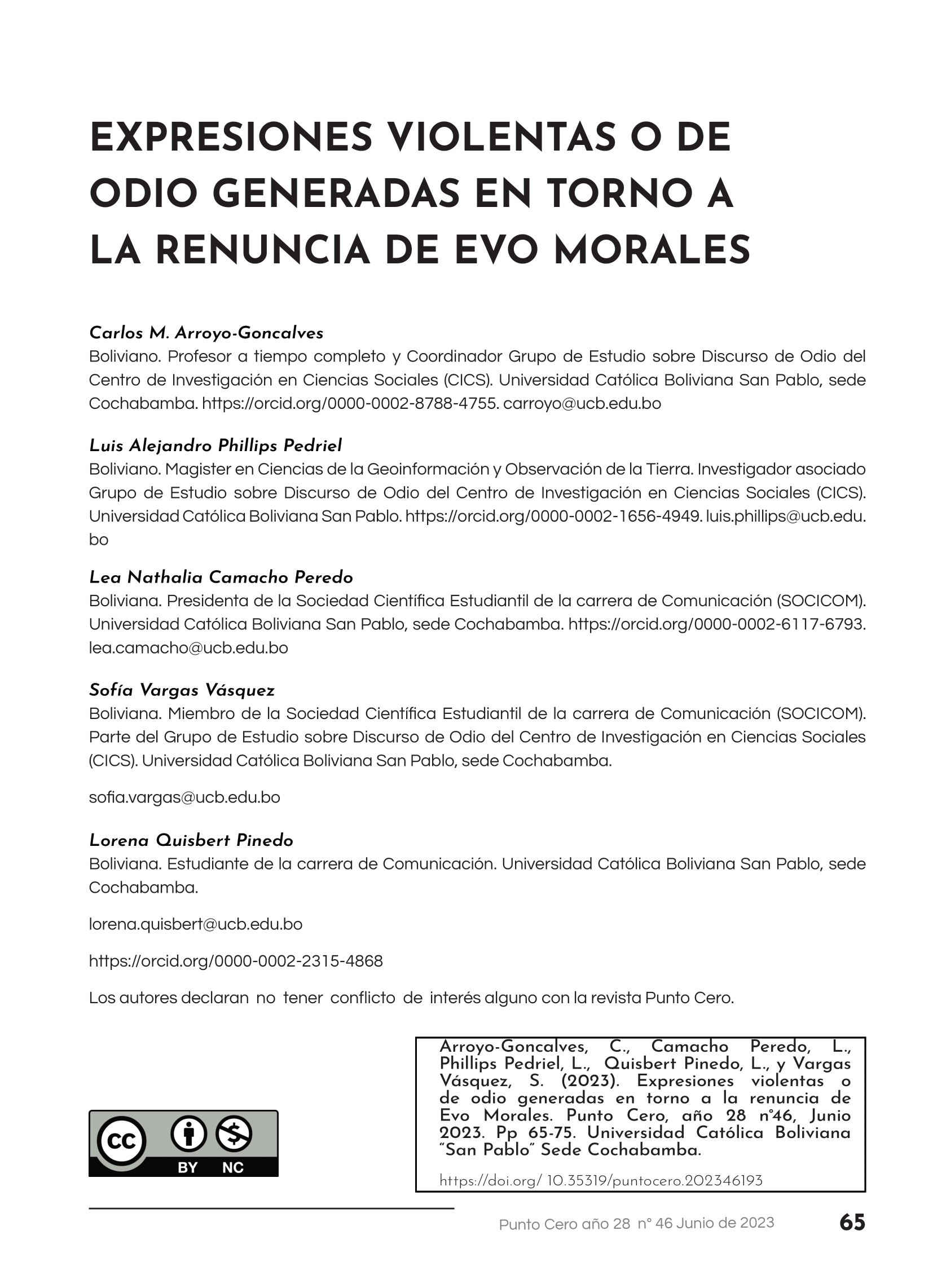Violent or hateful expressions generated around the resignation of Evo Morales
DOI:
https://doi.org/10.35319/puntocero.202346185Keywords:
Cyber hate, social upheavalAbstract
The paper will observe as a case study the public debate that was generated in digital social networks during the conflicts experienced after the 2019 national elections in Bolivia. The main objective is to classify the violent or hate expressions present in the most significant interactions on digital social networks generated around the resignation of Evo Morales on November 10, 2019. The political and social confrontation that lasted 21 days originated from the denunciation of an alleged electoral fraud (OAS, 2019). Citizens became polarized defending their both in the streets and in social networks. Bolivia was divided between “masistas” (who accused a coup and defended the former president) and “pititas” (who denounced electoral fraud and demanded the departure of Evo Morales). Two years later, the tension persists and is in polarized, often violent interactions that seek to impose the fraud vs. the coup discourse. The paper proposes an empirical study based on the observation of the phenomenon on Twitter. The type of study is descriptive with a mixed methodology. Collection techniques were used in digital social networks, data mining, semantic network analysis and cluster classification.
References
Brady, M., & Loonam, J. (2010). Exploring the use of entity‐relationship diagramming as a technique to support grounded theory inquiry. Qualitative Research in Organizations and Management: An International Journal, 5(3), 224-237. https://doi.org/10.1108/17465641011089854 DOI: https://doi.org/10.1108/17465641011089854
DÁndrea, C. (2021). Beyond collected data: Politics of APIs on social media platforms. MATRIZes, 15(1), 103-122. https://doi.org/10.11606/issn.1982-8160.v15i1p103-122 DOI: https://doi.org/10.11606/issn.1982-8160.v15i1p103-122
Haidar, J. (2005) La arquitectura del sentido. México: Escuela Nacional de Antropología e Historia.
Lelkes, Y. (2016). Mass polarization: Manifestations and measurements. Public Opinion Quarterly, 80(1), 392-410. https://doi.org/10.1093/poq/nfw005 DOI: https://doi.org/10.1093/poq/nfw005
Maté Jimenez, C. (2014). Big Data. Un nuevo paradigma de análisis de datos. Anales de mecánica y electricidad.
Micheli, M., Ponti, M., Craglia, M., & Berti Suman, A. (2020). Emerging models of data governance in the age of datafication. Big Data & Society, 7(2), 205395172094808. https://doi.org/10.1177/2053951720948087 DOI: https://doi.org/10.1177/2053951720948087
Miró Llinares, F. M. (2016). Taxonomia de la comunicació violenta i el discurs de l’odi a Internet. IDP. Revista d’Internet, Dret i Política, 22. https://doi.org/10.7238/idp.v0i22.2975 DOI: https://doi.org/10.7238/idp.v0i22.2975
OEA. (2019). Análisis de integridad electoral. Elecciones generales en el Estado Plurinacional de Bolivia, 20 de octubre de 2019. Hallazgos preliminares. Obtenido de http://www.oas.org/documents/spa/press/Informe-Auditoria-Bolivia-2019.pdf
Peralta, J. O. (2021, November 22). Bolivia y sus eternos conflictos sociales. Latinoamérica 21. https://latinoamerica21.com/es/bolivia-y-sus-eternos-conflictos-sociales/
Phillips, L., Ojeda, A., & Aleman-Andrade, A. (2021). Aproximaciones metodológicas para la investigación digital en Twitter. Revista Punto Cero, 26(43), 40-54. https://doi.org/10.35319/puntocero.202143179 DOI: https://doi.org/10.35319/puntocero.202143179
Quiroga, M. S.; León, C.; Meneses, O.; Pacheco, H. & Ríos, P. (2012). Perfiles de la conflictividad social en Bolivia (2009-2011): análisis multifactorial y perspectivas. Fundación UNIR Bolivia.
Robles, J., Guevara, J., Casas-Mas, B., & Gómez, D. (2022). Cuando la negatividad es el combustible. Bots y polarización política en el debate sobre el COVID-19. Comunicar, 71, 63-75. https://doi.org/10.3916/C71-2022-05 DOI: https://doi.org/10.3916/C71-2022-05
Sadowski, J. (2019). When data is capital: Datafication, accumulation, and extraction. Big Data & Society, 6(1), 205395171882054. https://doi.org/10.1177/2053951718820549 DOI: https://doi.org/10.1177/2053951718820549
Silva, L. Lopes, R., Botelho F & Sampaio, R. Discurso de ódio nas redes sociais digitais: tipos e formas de intolerância na página oficial de Jair Bolsonaro no Facebook. Galáxia (São Paulo) [online]. 2021, n. 46, e51831. Disponible en: https://doi.org/10.1590/1982-2553202151831. Epub 16 Jul 2021. ISSN 1982-2553. https://doi.org/10.1590/1982-2553202151831. DOI: https://doi.org/10.1590/1982-2553202151831
Srnicek, N. (2017). The challenges of platform capitalism: Understanding the logic of a new business model. Juncture, 23(4), 254-257. https://doi.org/10.1111/newe.12023 DOI: https://doi.org/10.1111/newe.12023
Stieglitz, S., Dang-Xuan, L., Bruns, A., & Neuberger, C. (2014). Social Media Analytics: An Interdisciplinary Approach and Its Implications for Information Systems. Business & Information Systems Engineering, 6(2), 89-96. https://doi.org/10.1007/s12599-014-0315-7 DOI: https://doi.org/10.1007/s12599-014-0315-7
van Dijck, J. (2014). Datafication, dataism and dataveillance: Big Data between scientific paradigm and ideology. Surveillance & Society, 12(2), 197-208. https://doi.org/10.24908/ss.v12i2.4776 DOI: https://doi.org/10.24908/ss.v12i2.4776
van Dijck, J. (2017). In data we trust? The implications of datafication for social monitoring. MATRIZes, 11(1), 39-59. https://doi.org/10.11606/issn.1982-8160.v11i1p39-59 DOI: https://doi.org/10.11606/issn.1982-8160.v11i1p39-59
van Dijck, J., Poell, T., & de Waal, M. (2018). The platform society. Oxford University Press DOI: https://doi.org/10.1093/oso/9780190889760.001.0001
UNIR. (2022). Análisis de Conflictos - UNIR Bolivia. Retrieved April 21, 2022, from https://analisisdeconflictos.unirbolivia.org/

Downloads
Published
How to Cite
Issue
Section
License
Copyright (c) 2023 Revista Punto Cero

This work is licensed under a Creative Commons Attribution-NonCommercial 4.0 International License.








